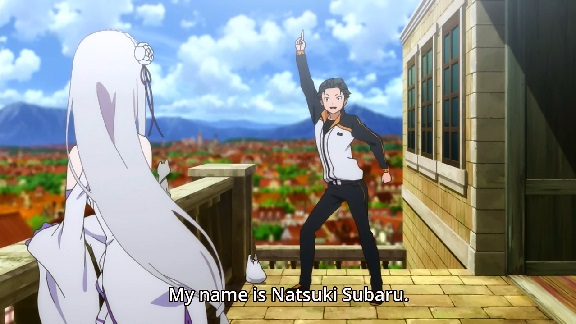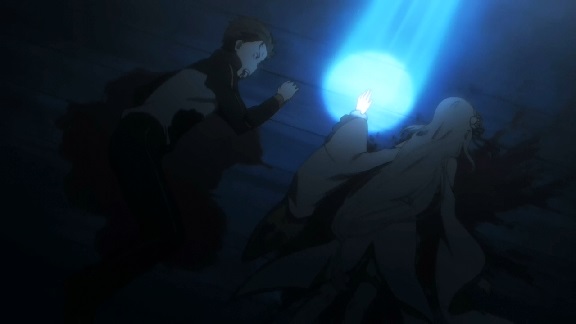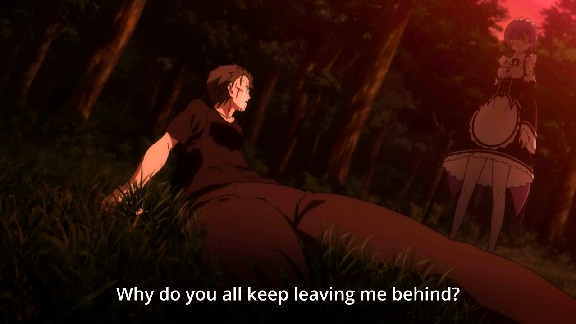
As you can tell by the way he walks, Natsuki Subaru is an otaku shut-in transported to a fantasy world, no time to talk. He takes it all in stride, sure he knows how the story will go as somebody will be there to give him an origin and magical powers. That doesn’t quite happen, but he does get involved with a silver haired sorceress who saves him from some robbers and who in return starts helping looking for her stolen badge. Genre savy and cocky, Subaru is a smart aleck and snarker, a familiar sort of hero, even his track suit is shared with KonoSuba’s protagonist. An otaku stand in, we’ve seen him before in other anime series where video game knowledge means the chance to become a badass in another world — though it takes Subaru far longer than it should to realise that every time he’s killed, he resets back to his starting point, “his last save game”.

Pure wish fulfilment of course, that idea of being able to reset and replay your life to make all the right choices the second time around and this time save everybody, getting to be the hero in your own private fantasy game. What makes Re:Zero interesting is that the series is aware that this ability isn’t cost free. For a start, there’s the act of dying itself, with Subaru coming to a gruesome end multiple times even in the first (double length) episode: even if he is good as new the moment he wakes up, the trauma and remembered pain is still there.

But that’s only part of it. The far worse part of it is what it does to his relationship with the people around him, after a few times being killed and resurrected. Because he becomes understandably focused on his goal of not dying, over time and a few cycles he starts behaving increasingly like a save scummer playing Dragon Age focusing on the most efficient path through the cycle, losing the emotional connection with what he’s doing. At the same time, all the history he builds up with his friends is lost after every reset, with only Subaru remembering it, having to rebuild it from scratch each time. Finally, from their view his actions must seem more and more irrational with each cycle, making him look more suspicious in a climate in which they’re already somewhat paranoid, making it more difficult for him to reconnect with them. No wonder he has a breakdown by episode seven.
There was a lot of criticism of Re:Zero precisely because Subaru was such a perfect cliché of the otaku wish fulfilment hero at first. Seven episodes in, it’s clear why this was necessary for the story Re:Zero wanted to tell. What it does is pulling the rug from under that fantasy of the otaku hero, by showing the cost hiding behind it. It’s an interesting subversion of the trapped in a fantasy game story, coming at it from yet another angle than KonoSuba or Grimgar did last season. This emotional journey is why I kept watching the series, even as some of the surface elements repelled me at first.
No Comments